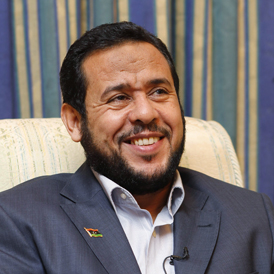Met to probe Libyan rendition claims
Senior UK security officials and ministers could be in the frame as the Metropolitan Police begins a new wider investigation into allegations of rendition in Libya, as Simon Israel reports.

Last November the Foreign Secretary William Hague expressed the hope that the conclusion of criminal investigations into the treatment of former detainees, including UK resident Binyam Mohamed would draw a line under the issue of the role of the UK security and intelligence services in the treatment of detainees.
And on Thursday a joint statement by Director of Public Prosecutions (DPP) Keir Starmer QC and the Metropolitan Police Service (MPS) confirmed that no individuals had been charged in relation to Operations Hinton and Iden, which had centred on the role of several MI5 and MI6 agents in these cases.
But the announcement on Thursday that the MPS will now investigate two cases of alleged rendition of Libyan nationals means that the whole question of the treatment of detainees has been thrown wide open once again. And whereas the previous investigations were focused on the conduct of field officers, the new ones will consider the strategies, command and conduct of those at the most senior levels of MI5 and MI6 as well as that of ministers.
One of those cases to be investigated involves the former rebel who now commands military forces in Libya, Abdel-Hakim Belhaj , and his wife Fatima Bouchar. Mr Belhaj (pictured above), who led the storming of Muammar Gaddafi’s Bab al-Aziziya compound last August, has already started legal proceedings against the British government for its alleged roles in their rendition to, and torture in, Libya in 2004.
He claims that after attempting to seek asylum in the UK, he was detained at the airport and deported to Kuala Lumpur, where he was held for several weeks.
They were then “forced to board an aircraft” for Bangkok, he claims, before being “separated, handed over to US authorities and taken to what they believe was a US secret prison, where “they were subjected to a barrage of barbaric treatment”.
Read more: Britain's alleged role in Libya rendition condemned
Mr Belhadj alleges that he “was hung by his wrists from hooks in his cell for prolonged periods, while hooded, blindfolded and viciously beaten” before being rendered to Libya by the US authorities.
On his arrival, Mr Belhadj says he was imprisoned for six years in some of the country’s worst jails, including Abu Salim in Tripoli, the site of the massacre of 1,200 prisoners by Gaddafi’s forces in 1996.
He claims that whilst imprisoned, he was interrogated by British agents.
The other case is likely to involve Sami al-Saadi (also known as Abu Munthir), who is also suing the government.
In October, classified documents were discovered in Tripoli that revealed MI6 played a significant role in his rendition. It has been reported that a fax the CIA sent to the then Libyan Foreign Minister Moussa Koussa “shows that the agency was eager to join in the Saadi rendition operation after learning that MI6 and Gaddafi’s government were about to embark upon it”.
Strong evidence
Speaking to Channel 4 News on Thursday one of the two Libyans’ lawyers, Rosa Curling, said the unguarded nature of these formerly classified documents represented evidence so strong that it would be hard for the police not to investigate: “they are very open in terms of their involvement, and in some ways almost a celebration of the way in which they have been helping the Gaddafi regime.”
“what seems to have happened is that we, along with the Libyans and the US, have conspired to seize these individuals, kidnap them in essence, and then render them back to Libya, where they were almost certain – and they must have realised this – to face torture.”
Lack of evidence
Despite saying on Thursday that due to lack of evidence against specific individuals no criminal charges would be brought in the cases relating to Binyam Mohamed and others, the Director of Public Prosecutions made clear that the decision not to prosecute did not mean that ill-treatment had not taken place.
Prisoners at Guantanamo Bay claim British security and intelligence officials colluded in their torture and abuse while they were held at the controversial detention centre.
A number of British Muslims had complained that they were questioned by agents after being tortured in Pakistan, Bangladesh, Afghanistan and Guantanamo, Egypt, Dubai, Morocco and Syria.